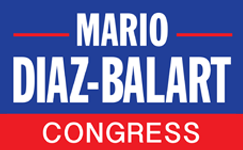WASHINGTON – Congressman Mario Diaz-Balart (FL-25), Chairman of the House Appropriations Subcommittee on Transportation, Housing and Urban Development, issued the following statement after the Appropriations Committee passed the fiscal year 2019 Transportation, Housing and Urban Development funding bill. The bill is now ready to be considered for a vote on the House floor.
“As we continue our commitment to revitalize America’s infrastructure, I am proud that I was able to once again deliver significant levels of funding. My bill prioritizes programs that are critical to keeping Americans moving and serves as another down payment on rebuilding our nation’s roads, bridges, airports, seaports, and transit systems. Many of these dollars will go directly to States, removing bureaucratic roadblocks and ensuring decisions are made at the community level. Substantial funding is also included for BUILD grants, Airport and Highway grants, and Capital Investment Grants, which will allow localities in Southern Florida, and across the country, to compete for funds to upgrade and modernize their infrastructure needs. I am particularly proud of a provision I included, alongside Defense Subcommittee Chairwoman Kay Granger, which addresses actions by the Chinese government to dominate transit manufacturing globally through unfair subsidies to their state-owned companies. This provision is critically important to our national security, as well as American businesses and manufacturers.
“In the housing section of my bill, I was able to include vital funds that will expand access to affordable housing through programs like the Community Development Block Grants (CDBG) and the HOME Investment Partnerships Program. I know how far these dollars will go, and how much these programs are able to leverage into private sector investment for the community. I was also able to include $50 million for a Mobility Demonstration that, through counseling and moving services, will help families move out of impoverished areas and closer to jobs and economic independence. I worked tirelessly with Chairman Jeb Hensarling on this issue, which will help address inter-generational poverty for families served by HUD. I am proud to be in a position to help Florida’s most vulnerable populations, and will continue working to protect our nation’s most needy.
“I thank Chairman Frelinghuysen for his continued support and guidance, and am humbled by his unwavering commitment to the American people. It has been an honor working with him and he will be missed on this Committee and in Congress. I look forward to getting this bill to the House floor in regular order and am thankful for this unique opportunity to deliver results for Southern Florida and our great country.”
As Chairman of this Appropriations Subcommittee, Diaz-Balart was able to secure the following funding so that localities across the country like Collier, Hendry, and Miami-Dade Counties could apply for and compete for grants to improve their infrastructure and transit systems and address their affordable housing needs.
- $4.25 billion for highway grants which goes directly to the states
- $750 million for the Department of Transportation’s BUILD grant program (formerly known as TIGER), helping localities fund infrastructure they might not be able to otherwise without federal dollars
- $250 million set aside for port projects
- $250 million set aside for urban areas
$250 million set aside for rural areas
- $1.3 billion for NextGen investments to modernize air traffic control
- $500 million for airport infrastructure grants
- $150 million is included for the Tribal Transportation Program to fund projects on federal and tribal lands
- $300 million for Consolidated Rail Infrastructure and Safety Improvements grants which will improve the safety, efficiency, and reliability of passenger and freight rail systems
- $150 million for grants to install positive train control (PTC) technologies
- $800 million for transit infrastructure grants
- $150 million for urbanized area formula grants
- $350 million for bus and bus facilities competitive grants
- $50 million for rural areas
- $200 million for state of good repair grants
- $50 million for high density state apportionments
- $2.6 billion for Capital Investment Grants, which provides grant funding for major transit capital investments that are planned and operated by local communities
- $835.7 million for signed new starts projects
- $500 million for unsigned new starts projects
- $200 million for signed core capacity projects
- $550 million for unsigned core capacity projects
- $502 million for small starts projects
- Language is included pushing the Administration to move projects through the pipeline and execute the program consistent with the will of Congress
- $3.3 billion for Community Development Block Grants (CDBG)
- $1.2 billion for the HOME Investment Partnerships Program, which provides incentives for private sector and non-profit development of affordable housing
- $22 billion in public housing vouchers, helping needy populations including the elderly, disabled, and veterans.
- $393 million for housing for persons living with HIV/AIDS
- $632 million for Housing for the Elderly
- $154 million for Housing for Persons with Disabilities




 PAID FOR BY MARIO DIAZ-BALART FOR CONGRESS
PAID FOR BY MARIO DIAZ-BALART FOR CONGRESS